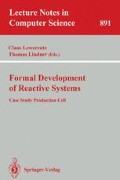Abstract
LCM 3.0 is a specification language based on dynamic logic and process algebra, and can be used to specify systems of dynamic objects that communicate synchronously. LCM 3.0 was developed for the specification of object-oriented information systems, but contains sufficient facilities for the specification of control to apply it to the specification of control-intensive systems as well. In this paper, the results of such an application are reported. The paper concludes with a discussion of the need for theorem-proving support and of the extensions that would be needed to be able to specify real-time properties.
Preview
Unable to display preview. Download preview PDF.
References
J.C.M. Baeten and W.P. Weijland. Process Algebra. Cambridge Tracts in Theoretical Computer Science 18. Cambridge University Press, 1990.
G. Berry and G. Gonthier. The ESTEREL synchronous programming language: design, semantics, implementation. Science of Computer Programming, 19:87–152, 1992.
B. Berthomieu and M. Diaz. Modeling and verification of time dependent systems using time Petri nets. IEEE Transactions on Software Engineering, SE-17:259–273, March 1991.
F. Bry, H. Decker, and R. Manthey. A uniform approach to constraint satisfaction and constraint satisfiability in deductive databases. In Proceedings of the International Conference on Extending Database Technology (EDBT), pages 488–505, Venice, 1988. Springer-Verlag.
R. Budde. ESTEREL Applied to the case study production cell. In Case Study “Production Cell”, FZI-Publication 1/94, pages 51–75. Forschungszentrum Informatik an der Universität Karlsruhe, 1994.
P. Coad and E. Yourdon. Object-Oriented Analysis. Yourdon Press/Prentice-Hall, 1990.
H. Ehrig and B. Mahr. Fundamentals of Algebraic Specification 1. Equations and Initial Semantics. Springer, 1985. EATCS Monographs on Theoretical Computer Science, Vol. 6.
R.B. Feenstra and R.J. Wieringa. Validating database constraints and updates using automated reasoning techniques. Submitted for publication.
R.B. Feenstra and R.J. Wieringa. LCM 3.0: a language for describing conceptual models. Technical Report IR-344, Faculty of Mathematics and Computer Science, Vrije Universiteit, Amsterdam, December 1993.
J.A. Goguen, J.W. Thatcher, and E.G. Wagner. An initial algebra approach to the specification, correctness, and implementation of abstract data types. In R.T. Yeh, editor, Current Trends in Programming Methodology, pages 80–149. Prentice-Hall, 1978. Volume IV: Data Structuring.
H. Gomaa. Software Design Methods for Concurrent and Real-Time Systems. Addison-Wesley, 1993.
M. Jackson. System Development. Prentice-Hall, 1983.
P.A. Spruit and R.J. Wieringa. Some finite-graph models for process algebra. In J.C.M. Baeten and J.F. Groote, editors, 2nd International Conference on Concurrency Theory (CONCUR'91), pages 495–509, 1991.
P.T. Ward and S.J. Mellor. Structured Development for Real-Time Systems. Prentice-Hall/Yourdon Press, 1985. Three volumes.
R.J. Wieringa. A formalization of objects using equational dynamic logic. In C. Delobel, M. Kifer, and Y. Masunaga, editors, 2nd International Conference on Deductive and Object-Oriented Databases (DOOD'91), pages 431–452. Springer, 1991. Lecture Notes in Computer Science 566.
R.J. Wieringa. A method for building and evaluating formal specifications of object-oriented conceptual models of database systems (MCM). Technical Report IR-340, Faculty of Mathematics and Computer Science, Vrije Universiteit, December 1993.
R.J. Wieringa and R.B. Feenstra. The university library document circulation system specified in LCM 3.0. Technical Report IR-343, Faculty of Mathematics and Computer Science, Vrije Universiteit, Amsterdam, December 1993.
R.J. Wieringa and W. de Jonge. Object identifiers, keys, and surrogates. Theoretical and Practical Aspects of Object Systems, To be published.
R.J. Wieringa, W. de Jonge, and P.A. Spruit. Roles and dynamic subclasses: a modal logic approach. In M. Tokoro and R. Pareschi, editors, Object-Oriented Programming, 8th European Conference (ECOOP'94), pages 32–59. Springer, 1994. Lecture Notes in Computer Science 821. Extended version to be published in Theory and Practice of Object Systems (TAPOS).
R.J. Wieringa and J.-J.Ch. Meyer. Actors, actions, and initiative in normative system specification. Annals of Mathematics and Artificial Intelligence, 7:289–346, 1993.
R.J. Wieringa and J.-J.Ch. Meyer. DEIRDRE (deontic integrity rules, deadlines and real time in databases). Faculty of Mathematics and Computer Science, Vrije Universiteit., 1993.
E. Yourdon. Modern Structured Analysis. Prentice-Hall, 1989.
Author information
Authors and Affiliations
Editor information
Rights and permissions
Copyright information
© 1995 Springer-Verlag Berlin Heidelberg
About this chapter
Cite this chapter
Wieringa, R. (1995). LCM and MCM. In: Lewerentz, C., Lindner, T. (eds) Formal Development of Reactive Systems. Lecture Notes in Computer Science, vol 891. Springer, Berlin, Heidelberg. https://doi.org/10.1007/3-540-58867-1_63
Download citation
DOI: https://doi.org/10.1007/3-540-58867-1_63
Published:
Publisher Name: Springer, Berlin, Heidelberg
Print ISBN: 978-3-540-58867-2
Online ISBN: 978-3-540-49133-0
eBook Packages: Springer Book Archive

